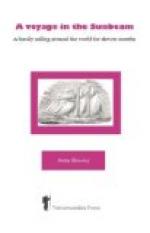Sunday, February 18th.—We were awakened in the night by a heavy gale, with snow and sleet beating furiously on the deck. In the morning the land was covered with snow, the water froze as it was pumped on deck, and the bitter wind howled and whistled through the rigging. In the afternoon the wind even increased in violence, the snowstorms became more frequent, and the sky was dark and overcast.
We had service at eleven and again at four. The sun set cold and stormy, promising a wild night. At times the shore was quite hidden by the snowstorms, though only a few cables’ lengths off.
Monday, February 19th.—The wind and weather became worse than ever, and, as time was precious, Tom decided to retrace our steps for a short distance and go through the Bungo Channel, between the islands of Sikok and Kiusiu, instead of going out to sea through the Simono-seki Straits, as, in the latter case, the gale would be right in our teeth, and we should make but little progress. Now we shall be under the shelter of Kiusiu and the Linschoten and Luchu islands for at least two days, and so make a fair wind of it. Steering due south, too, we may hope to be soon out of this horrid weather. The only drawback to this plan is that we shall miss seeing Nagasaki, which I much regret. There are no great sights there, but the scenery is pretty, and the place is interesting owing to the fact that it was the first and for many years the only, port open to foreigners, and also the scene of the cruel murders of Christians and the site of the beautiful island of Pappenberg. Shanghai I do not think I regret so much, though Tom would have been interested to talk with the merchants about their commerce, and to see their houses, many of which are, I am told, perfect palaces. It would be very cold there, too, at this time of year; and I do so long to lose my cough and feel warm once more.
At 8.30 p.m. we weighed and proceeded under steam. The views of the mountains, between the snowstorms, were lovely, with the fresh-fallen snow shining in an occasional gleam of sunshine. We soon passed the Isaki light, with wind and tide in our favour, and at sunset found ourselves in the open waters of the North Pacific.
Tuesday, February 20th.—A lovely day; the thermometer already twenty degrees higher than it was yesterday. The wind had dropped, and at 10 a.m. it had become so calm that fires were lighted.
It was delightful to see everybody and everything on board—people, children, animals, and birds, all and each sunning themselves, and trying to get thawed after the freezing they have had. We have unfortunately lost one of the Hawaiian geese, which I much regret, as it is irreplaceable. None have, I believe, ever been exported before. The pig from Harpe Island is very well. We have not seen him all the cold weather, as he has been buried in straw in a box, but they say that the cold has stopped his growth.




